Friday Feb 27, 2026
Friday Feb 27, 2026
Friday, 8 March 2019 00:00 - - {{hitsCtrl.values.hits}}


By Charumini de Silva
The International Finance Corporation (IFC), a member of the World Bank Group, partnered with the Colombo Stock Exchange (CSE) for the fourth consecutive year to ring the opening bell for trading to celebrate International Women’s Day 2019 —a partnership which highlights how the private sector can spur women’s participation in the global economy to promote sustainable and inclusive development.
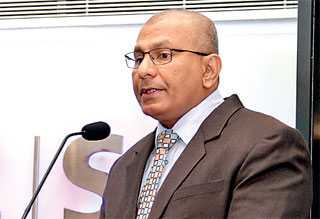 |
CSE Chairman Ray Abeywardane |
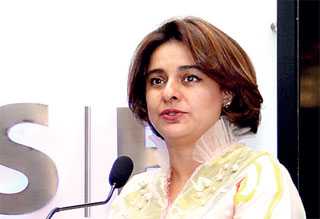 |
IFC Country Manger For Sri Lanka Amena Arif |
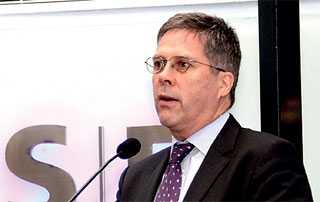 |
Acting Austarlia High Commissioner Sri Lanka John Philip |
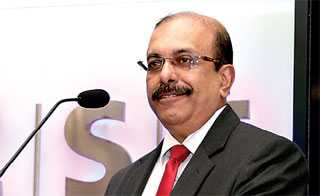 |
SLID Chairman Preethi Jayawardena |
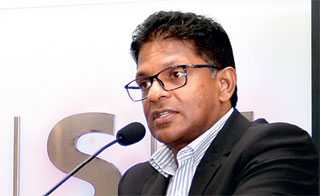 |
Global Compact Network Sri Lanka Director Rathika De Silva |
Delivering the opening remarks CSE Chairman Ray Abeywardena stressed that the CSE was fully committed for equal opportunities, adding that they were looking at strengthening the women participation at board level.
“About 10% or above of the board representation of the listed entities are women, and think that is a good area to focus on to improve. I believe that there are efforts being made in that direction as well,” he said.
Abeywardena also noted that the team at CSE walk the talk in terms of gender equality. “Statistics of the employment says that 40% of our staff and 45% of the senior management are ladies. I am pleased and appreciate the culture in which the CSE function over a long period of time. Gender equality has been widely practiced in this institution,” he added. IFC Country Manager for Sri Lanka and Maldives Amena Arif said as business leaders, entrepreneurs, employees and consumers, women are fundamental to inclusive growth.
“We view the latest statistics on Women on Boards in Sri Lanka as an important catalyst for fresh commitments to diversity at the top and revitalised conversations about harnessing the economic potential of more gender-balanced boards in the country.”
A recent research by IFC and CSE indicates that about 8.5% of listed company board directors in Sri Lanka are women – a marginal increase from that of 8.14% last year. “We view the latest statistics on Women on Boards in Sri Lanka as an important catalyst for fresh commitments to diversity at the top and revitalised conversations about harnessing the economic potential of more gender-balanced boards in the country,” Arif said.
This year’s Ring the Bell event in Colombo also marked the release of the aforementioned report ‘The Case for Gender Diversity Among Sri Lanka’s Business Leadership’, as well as the second edition of the Women on Boards Directory, a crucial repository of 136 women directors on the boards of CSE-listed companies in 2018.
Empowering women in the workplace can also generate financial returns in the private sector, as IFC’s latest research reviewing the top 30 companies on the CSE highlights. Global research shows that companies with at least one female director have better share price performance and return on equity, and companies with more than one woman on the board return 3.7% a year over those that have none.
Acting Australian High Commissioner to Sri Lanka and the Maldives Jon Philp said achieving gender equality does not just benefit women, but it benefits everyone.
He said Australia has chosen to focus on women’s economic empowerment in the private sector because this is where they see greatest potential for impact.
“Our Women in Work partnership will create more and better private sector employment and business opportunities for women,” the Acting High Commissioner said.
Sri Lanka Institute of Directors (SLID) Chairman Preethi Jayawardena said that they strongly believe that gender equality is essential for a high-performing and talent-led organisations.
“We at SLDI believes that enabling the potential of women is central in ensuring sustainable and inclusive development both in business and in the community,” he added.
He outlined that over the years, SLID has been conducting programs with special focus given to women on boards to pave the way for women to embrace leadership roles in the corporate world and also to discuss the issues faced by women in leadership.
Jayawardena also noted that their consultants with the Securities and Exchange Commission (SEC) has been positive with their suggestion for progressive quotas for women on boards and has been included in Budget 2019 presented this week.
“This is an unprecedented move,” he said.
Global Compact Network Sri Lanka Director Rathika De Silva said Sri Lanka needs more women participation in all sectors of our economy.
He believes gender equality and women empowerment will enable Sri Lanka to continue towards a sustainable development while setting high standards in these areas.
The ‘Women on Boards’ program is part of IFC’s broader efforts to increase women’s private sector participation and leadership by promoting the adoption of corporate governance best practices among Sri Lankan companies. IFC’s work in this area is supported by the Australian Government under an IFC-DFAT Women in Work partnership.
Pix by Chamila Karunaratne
